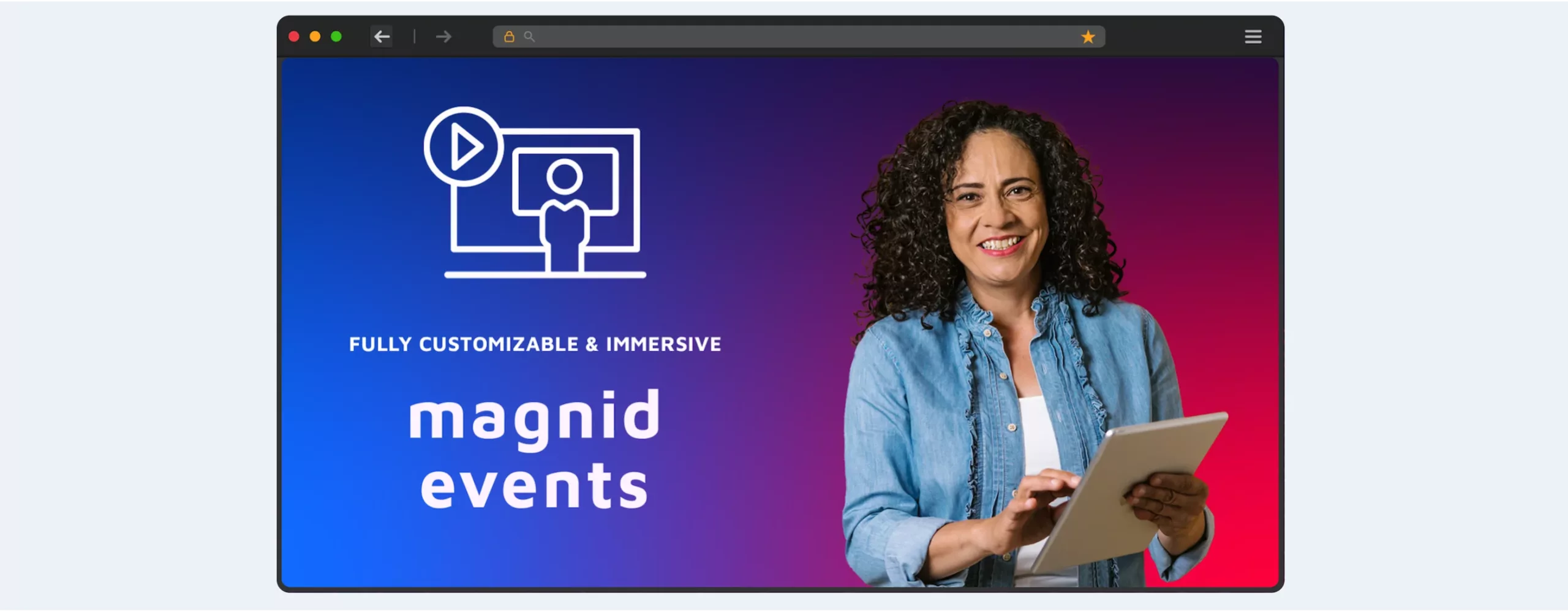
Discover our new use cases: magnid events
Thursday, October 05, 2023
Lioba Hackert
Reading time: 03:30 minutes
Over the past few years, the landscape of events and conferences has undergone a remarkable transformation. In an increasingly interconnected world, events now draw attendees from various countries. Factors such as environmental concerns, travel limitations due to visa restrictions or natural disasters, and cost-effectiveness made us rethink our need for overall travel and meeting behavior.
How can we help to still foster the increasing interconnectivity while having a respectful concept towards our environment?
Let’s take a look at platforms for digital and hybrid events and how they have responded by offering comprehensive solutions that not only bridge geographical gaps but also introduce a great variety of possibilities for event organizers and participants alike. How can event platforms help us to host environmentally responsible but at the same time exciting and engaging events and what do we need to be aware of when hosting a virtual or hybrid event?
Visualization
The way your virtual platform looks (and feels) can have a great impact on your audience’s overall experience. The more immersive, the higher the level of attention. Not only do you create something a little more interesting than the average platform, but if you create something that represents your brand, it makes the content more relevant to your audience: it is placed in a better context. The advantage of creating something unique and strategically reusing it for all events also has the benefit of creating a recognition value. You also choose a special location for your face-to-face events, don’t you?
Engagement
Engaging your event participants is a central challenge in any event, but it takes on added importance when hosting digital and hybrid events. The absence of physical proximity and participants sometimes joining from all over the world makes it even more important to find innovative ways to maintain active involvement and interest among attendees. Capturing and sustaining your attendees’ attention throughout the entire event is a fundamental goal. Especially when hosting hybrid events, make sure you create one agenda per event format – to respect concentration spans in both environments. Also, traditional engagement strategies, such as charismatic speakers or dynamic presentations, may need to be adapted for the virtual environment. Gamification, interactive sessions, and immersive experiences can play a pivotal role in achieving this goal. When attendees feel engaged, they are more likely to derive value from the event and remain invested in its proceedings.
Interactivity & Networking
Creating opportunities for participants to interact with each other and with the provided event content can be a game-changer in keeping your audience engaged. Virtual events should always provide room for participants to network, take part in live Q&A sessions, and participate in polls or discussions. By enabling attendees to actively shape the direction of the event and contribute to its content, a sense of ownership and community is created. This keeps participants engaged and fosters a dynamic and collaborative environment that sets virtual events apart from passive webinars or conferences.
Content
Content is the heart and soul of any event, and delivering content that is relevant to the audience is key to every successful event. Relevant content not only makes the event worthwhile for participants but also aligns with their expectations. Event organizers must not solely focus on the “why” and “what” but also pay attention to the “how” they deliver content to their audience. In addition to the content itself, how it is presented holds equal importance. Besides presenting content in a clear and logical structure, content should incorporate features that further capture and enhance the attendee’s engagement.
Data and Analytics
The digital nature of virtual events provides a unique advantage – access to a wide range of data and analytics. This data helps event organizers understand participant behavior, preferences, and satisfaction levels. Comprehensive data analytics enable organizers to make informed decisions and improvements for future events. Gathering feedback through surveys, tracking attendance, monitoring session interactions in real-time, and analyzing user-generated content are just a few examples of how data can be utilized. This data-driven approach allows event planners and organizers to refine their strategies, identify areas for enhancement, and create more tailored and engaging experiences in any future events.
Accessibility
Accessibility and seamless technology are maybe one of the most important things to look out for when hosting a successful virtual event. Participants must be able to access the event easily, regardless of their location or device. Event organizers must offer a seamless login experience, and technical support, and provide clear instructions to their attendees. Accessibility features, such as screen reader compatibility, should be integrated to accommodate diverse audiences and promote inclusivity.
At magnid, we embrace digital evolution and are always making sure to integrate the latest technology. Knowing the importance of engagement, interaction, and creating relevant experiences, we put that at the heart of our development, building a true gateway to a connected world. Through our strategic approach, technological know-how, and creative expertise we have planned and executed numerous onsite, virtual, and hybrid events. If you would like to learn more about our different use cases, check out our website.
Curious to take a tour? Contact us!

